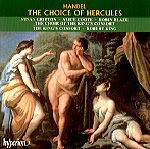Handel’s The Choice of Hercules is a one-act allegorical drama in three scenes, presented in the style of a cantata. The invention of this rather strange work–also described on Handel’s autograph score as a “Musical Interlude”–sprung from the composer’s busy schedule in the summer of 1750 (he was planning a trip to the continent and apparently was unable to compose a full-length oratorio) and from the fact that he had some perfectly wonderful music lying around that he had written the previous year for a play, Alceste, that was never staged. (The play itself, by Tobias Smollett, has been lost.) So the ever-resourceful Handel gathered together music from Alceste, added a few new numbers, and applied this to a libretto drawn from a narrative poem by Robert Lowth, The Choice of Hercules.
The story concerns the choice Hercules (countertenor) must make between Pleasure (soprano) and Virtue (mezzo-soprano). The drama plays out (he chooses Virtue, of course) to some of Handel’s loveliest arias, a nifty trio at the work’s climax, and some sturdy if not outstanding choruses. No matter what you may think about the virtues of the story or its outcome, one thing’s certain: the listening is easy and the entertainment is light. This is assured by the uniformly fine performances by soprano Susan Gritton (her Pleasure arias at the opening are sublime), mezzo Alice Coote (a warmly appealing Virtue), and countertenor Robin Blaze, who shows special relish for his few but very expressive arias. A highlight is the deftly, dazzlingly sung “Enjoy the sweet Elysian grove” by tenor Charles Daniels, who gets this one chance to shine in his role as Attendant on Pleasure. The orchestral playing is accordingly crisp and properly energetic, and Robert King keeps things moving with no letup in the drama. The one minus is the somewhat unfocused sound that places the chorus too distant at times, too close at others, and that keeps detail less than sharp in the tutti sections.
The filler is Maurice Greene’s ceremonial anthem Hearken unto me, ye holy children (1728), a 15-minute set of solos and choruses (and one duet) whose juxtaposition with Handel’s work just makes clear the superiority of Handel’s invention and sense of how to effectively present his material–whatever it may be. Sure, there’s some very attractive music here, but it’s mostly memorable because of Peter Harvey’s exquisite bass singing and similar efforts by his colleagues Blaze and Daniels. The real reason listeners will buy this disc is for the Handel–and in that regard, no one should be disappointed.
































